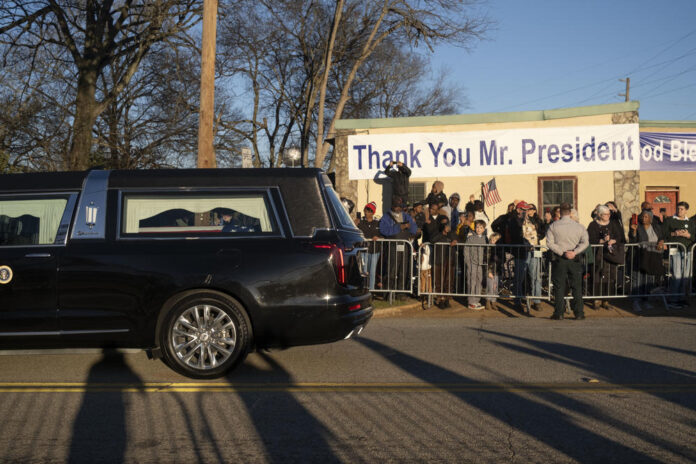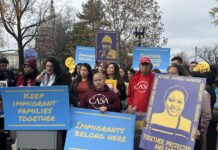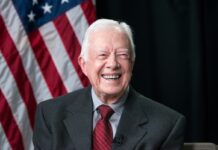
Former President Jimmy Carter’s funeral ended Thursday where it began — in Plains, his and the former first lady Rosalynn’s hometown in South Georgia.
Carter died Dec. 29 at 100 years old.
The funeral procession carrying Carter’s coffin arrived at Maranatha Baptist Church late Thursday afternoon after traveling from Fort Moore. Carter had been lying in state in the U.S. Capitol in Washington, D.C., since Tuesday.
The private funeral service at Maranatha was led by Tony Lowden, Carter’s personal pastor and the church’s first Black pastor. Carter, a proud Christian, regularly attended and taught Sunday school at Maranatha Baptist Church until about his mid 90s.
Supporters of the Carter family and the people of Plains braved freezing weather after nightfall to watch the motorcade depart the church after delays in ceremonies during the day.


(Sofi Gratas/GPB News)
Carter was buried next to wife Rosalynn at their longtime home a few minutes from downtown on Thursday evening in a private ceremony, surrounded by family.

(Grant Blankenship/GPB News)
A final sendoff
When the roads leading into Plains closed around 2 p.m. on Thursday, people were already lining the downtown streets. Thousands of visitors have visited over the past week to pay tribute to the former president in different ways.

(Sofi Gratas/GPB News)
At the Plains Visitors Center, formerly the town’s high school, Paula McNeil from Valdosta said she drove down for the final day of the funeral to feel closer to the former president.
“I wanted to be on the ground where he grew up,” McNeil said. “I wanted to be around a community that was exuding kindness toward someone they lost, as a lesson to all of us, you know, as he did, to love one another.”
She said she was able to light a candle at Maranatha before the ceremonies started.
Ken Basquit from Florida laid four coins on a memorial in downtown Plains, a tradition played out in several cultures around the world.
“I put two coins for each of them — Rosalynn and President Carter,” Basquit said.
Earlier on Thursday florist Sherri Gerland was freshening up that same downtown memorial in preparation, getting rid of some flowers that had frozen and died overnight.
She straightens a packet of Georgia peanuts atop the plaque.
“They actually wanted us to remove everything and I’m like ‘No, no, no, this is sentimental,’” Gerland said.

(Sofi Gratas/GPB News)
Presidential funerals are planned years in advance and require several agencies to coordinate. That includes the National Park Service.

(Sofi Gratas/GPB News)
On the first day of ceremonies on Jan. 4, ranger Robin Thomas was directing traffic at the town visitors center.
Thomas, a dispatch supervisor, was one of several parks employees from other states sent to Plains to help with the funeral.
“My kids, my grandkids, my great-grandkids will all know that I had … a small part in the funeral of our 39th president, Jimmy Carter,” Thomas said.
The National Park Service plays an integral role in Plains. It runs the Jimmy Carter National Historic Park, which includes the visitors center, the old train depot-turned-campaign headquarters, the Carter’s home and Jimmy Carter’s boyhood farm in nearby Archery, Ga.
Park rangers were honored in a private ceremony last Saturday at the boyhood farm when the funeral procession stopped and the farm bell was rung 39 times in tribute to the former president.
Amid the “sprucing up” in preparation, Thomas said she made sure to grab a memento for herself.
“I even got a couple of acorns from the tree, from the boyhood farm, that I’m going to go home and plant in West Virginia so I can have my Carter tree,” Thomas said.

(Sofi Gratas/GPB News)
With just over 500 residents, it’s no wonder most locals have a special memory of Jimmy and Rosalynn Carter. Like Catina Harvey, who, born and raised in Plains, described seeing Jimmy Carter out jogging.
“He’d wave us out of the yards and say ‘Come on, come on!’ And we’d run right behind him,” she said.
Tracey Stewart said she attended several Sunday School classes of Carter’s as a child, and remembers a day when she was invited up to stand with Carter and sing hymns.
Once Carter became governor of Georgia and then president, Stewart said she kept up with his politics, and also followed his work with the Carter Center and beyond. She said throughout, she admired his eagerness to reject racism and discrimination in a time when that wasn’t the norm, and especailly as a representative of the Deep South.
“He saw us as equal,” Stewart said. “His work has spoken for him, and at the end result, it’s a well-done job.”
This article comes to Now Habersham in partnership with GPB News







